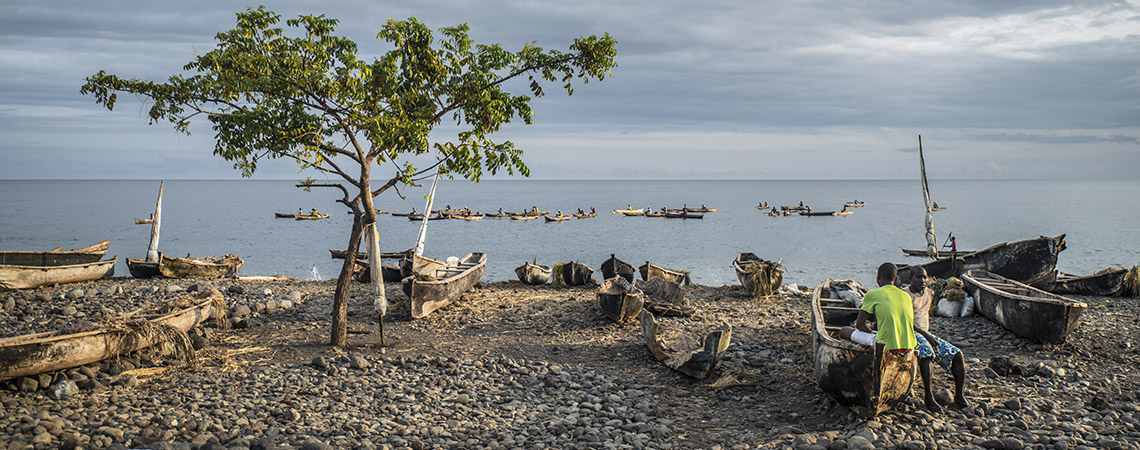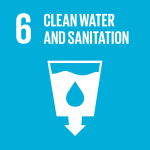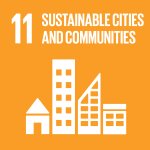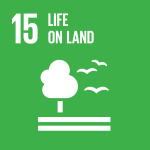
Photo:
Climate change in São Tomé and Principe is causing increased precipitation, temperature, and sea-level rise, affecting coastal assets and watercourses. The cities of Sao Tome and Santo António, with around 43 percent of the total population, are particularly vulnerable due to intense rainfall, surface runoff, and limited water treatment systems, with recurrent water supply interruptions for one-third of the population. Women and girls suffer disproportionally as they must walk long distances to fetch water for domestic needs.
With funding from the GEF-Least Developed Countries Fund, and $15 million in co-financing from Ministry of Environment, the proposed project aims to increase the resilience of urban areas and vulnerable communities to the impacts of climate change driven floods; and to increase water security in São Tome and Principe.
The Directorate of Environment and Climate Action (DAAC) under São Tomé and Principe’s Ministry of Environment will execute the project.
- Community
- Municipality
- District
- National
- Local Governments
- National Governments
- Non-Governmental Organizations
- Private Sector Partners
- United Nations Development Programme (UNDP)
95,395 direct beneficiaries (47,221 male; 48,174 female), approximately 42.7% of the country’s total population
- United Nations Development Programme (UNDP)
- Global Environment Facility (GEF)
- Government of Sao Tome and Principe
Expected outcomes
Outcome 1. Effective Institutional framework for climate-resilient planning and development of the water (including drainage and sanitation) and waste sectors.
Outcome 2. Effective operational capacity in place for climate-resilient water and waste sector coordination.
Outcome 3. Improved management of watershed and drainages infrastructures for better response to climate driven floods.
Outcome 4. Reduce water quality risk through improved monitoring and effective waste collection.
Outcome 5. Project knowledge is managed to foster learning, adaptive management, sustainability, and replication.
Outcome 6. Project results are monitored and evaluated to foster adaptive management and sustainability.
- Image

- Image

- Image

- Image

São Tomé and Principe (STP) is especially vulnerable to the effects of climate change in the form of increased precipitation, temperature, and sea-level rise, affecting most assets along the coast and along the watercourses.
The cities of Sao Tome and Santo António are particularly very vulnerable. This vulnerability recurrently affects the water security of 95,395 people (approximately 42.7% of the country’s total population). The two cities’ vulnerability is particularly due to, on one hand, climate-induced intense rainfall leading to flooding in the cities of Sao Tome and Santo António, because their drainage systems were not designed to accommodate such levels of rainfall. The intense rainfall also accelerates surface runoff, which pulls dirt into the drainage systems and further constrain their capacities.
On the other hand, 50 percent (eight out of 16) water treatment and distribution systems, operated by the national Water and Energy Utility - EMAE, rely on surface water only and are often forced to stop operating when climate-induced intense rains significantly increase water turbidity (due to soil runoff). This leads to recurrent water supply interruptions for one third of the country’s population. Women and girls disproportionally suffer from such interruptions, as they then have to walk long distances in search for water for domestic needs.
This project’s objective is thus to increase (1) the resilience of urban areas and vulnerable communities to the impacts of climate change-driven floods and (2) water security in São Tome and Principe. It will apply Integrated Water Resources Management (IWRM) to foster an enabling environment for a climate-sensitive and integrated water-waste-drainage systems management and enhance the climate resilience of both cities to flooding and urban water supply interruptions. In this regard, the project will improve upstream catchment management to reduce surface runoff, increase the urban drainage capacities to cope with the recurrent and above-normal surface flows, and enhance waste management that constrains drainage systems following intense rains.
To achieve the proposed objectives, the project will engage with a wide range of stakeholders, including the participation of policy makers to promote the necessary institutional and legal frameworks and strengthen the political relevance of the topics addressed. Additionally, the project will promote an active collaboration of government entities and technical staff from various sectors, at the local, regional, and national level, recognizing the multidimensional scope of the intervention. Also, there will be a direct engagement with civil society, private sector, and the target population as key drivers of the change to be achieved by improved (integrated) management of watershed and water, waste and drainage infrastructures.
The Directorate of Environment and Climate Action will execute the project.
Outcome 1. Effective Institutional framework for climate-resilient planning and development of the water (including drainage and sanitation) and waste sectors.
Output 1.1. Legal and institutional framework reviewed and operationalized towards a climate-resilient water, drainage and waste management.
Output 1.2. Advocacy, training and awareness raising for policy makers, technical staff and communities to support flood prevention and adaptation.
Outcome 2. Effective operational capacity in place for climate-resilient water and waste sector coordination.
Output 2.1. National and regional Coordination system for data-driven planning, budgeting and implementation.
Output 2.2. National and regional administration trained for operationalizing and upscaling integrated water resource management and resilient city planning.
Outcome 3. Improved management of watershed and drainages infrastructures for better response to climate driven floods.
Output 3.1. Improved watershed management as a Nature-Based solution for aquifer recharge to reduce rainwater runoffs in Agua Grande Watershed.
Output 3.2. Priority drainage works to reduce flood risks in the main urban areas, defined, and implemented.
Outcome 4. Reduce water quality risk through improved monitoring and effective waste collection.
Output 4.1. Control system put in place for monitoring of water quality in river basins of Água Grande and Santo António (Principe).
Output 4.2. Implement a sustainable drainage waste management system in the city of São Tomé.
Outcome 5. Project knowledge is managed to foster learning, adaptive management, sustainability, and replication.
Output 5.1. Knowledge management and dissemination system, mainstreaming gender equality and PwD, for evidence-based decision-making and scaling up of best practices.
Outcome 6. Project results are monitored and evaluated to foster adaptive management and sustainability.
Output 6.1. Effective Monitoring and Evaluation Plan implemented.
A monitoring and evaluation (M&E) plan will be prepared at PPG stage and it will include gender-specific aspects to allow the project to support gender equity in the water sector.
Project-level monitoring and evaluation will be undertaken in compliance with UNDP requirements as outlined in the UNDP POPP and UNDP Evaluation Policy.
The UNDP Country Office is responsible for ensuring full compliance with all UNDP project monitoring, quality assurance, risk management, and evaluation requirements. Activities under the M&E component will include the hosting of an Inception Workshop (and development of the associated report); producing annual GEF Project Implementation Reports (PIRs); monitoring of Social and Environmental Safeguards Screening, stakeholder engagement and gender action plans; supervised site visits and on-the-ground assessments; an Independent Mid-term Review (MTR); and a Terminal Evaluation (TE).
Mr. Mulengera Bahalokwibale, Regional Technical Advisor, Climate Change Adaptation, UNDP
mulengera.bahalokwibale@undp.org

